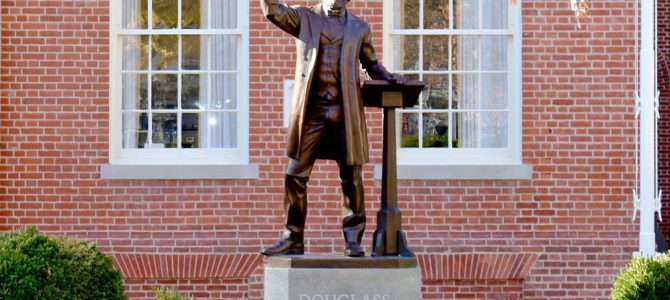
This year’s Independence Day was ripe with political arguments about whether America is truly great, inherently white supremacist, or just okay as claimed by a New York Times opinion writer. One of the greatest disagreements is on the state of race relations in contemporary America.
Recently Democratic presidential hopeful Robert Francis “Beto” O’Rourke told a group of immigrants, “This country was founded on white supremacy and every single institution and structure that we have in this country still reflects the legacy of slavery and segregation and Jim Crow and suppression even in our democracy.” But Frederick Douglass, America’s greatest abolitionist voice, did not see it this way.
Douglass was brought to the forefront of the current public debate on race and the founding when former NFL player Colin Kaepernick posted a tweet quoting Douglass’ famous speech, “What to the Slave is the 4th of July?” He cited a portion of the speech in which Douglass laments that the holiday does not belong to him as a black man in the context of slaveholding America.
U.S. Sen. Ted Cruz soon responded with a thread of tweets excerpting other portions of the speech in which Douglass extols the noble principles of the Declaration of Independence. But this Twitter exchange is insufficient to address the complexity of Douglass’s thought conveyed in this speech.
Douglass’s view of America changed over time. Upon his harrowing escape from slavery, Douglass was full of anger. He hated the country for permitting his unjust enslavement. He aligned himself with the abolitionist William Lloyd Garrison, who notably made the case that slavery was an integral part of a corrupt compromise with the South in the Constitution.
Douglass took a similar position in his early work. For example, he exclaimed: “I have no love for America, as such; I have no patriotism. I have no country. What country have I?” In his early life, he believed the country that permitted slavery was simply irredeemable. In other words, he did hold the O’Rourke-Kaepernick view of America as designed for whites only, at least for a time, but he later came to believe this position was untenable and did not fulfill his goal of bringing about equality.
Douglass began his life as the slave of a white master, treated as an animal. His argument that he had no country is understandable given his circumstances. He was viewed as less than a man by many, and certainly was not born to the rights and privileges of citizenship.
Yet the injustice of slavery was ultimately overcome by the higher principles contained in the Declaration of Independence and Constitution. The Declaration described that “all men are Created equal.”
Douglass knew this well, and it was only because of the Declaration’s appeal to the natural right of equality that he could effectively make his case against slavery. The Constitution was designed to enact a republican system of government that would protect one’s natural rights as a human being, regardless of race. Ultimately, it was the U.S. Constitution, then, that demanded and ultimately achieved racial equality in America.
Douglass’s early anger was justified, but he came to understand that the principles that are enshrined in the Declaration and protected by the institutions of the Constitution were not the real problem, contra O’Rourke. The people responsible for carrying out those principles, who failed to uphold and fully apply them, were to blame.
Douglass explained, “We have for a long time hesitated to adopt and carry out the only principle which can solve that difficulty and give peace, strength and security to the Republic, and that is the principle of absolute equality.” We may have hesitated, but America uniquely held the principle of equality in its founding, which cannot be said of any other nation.
Douglass spent decades of his public life describing to countless numbers of Americans what the country was meant to be, and we are the beneficiaries of this noble work. He exhorted Americans to live up to the noble principles of the Founding. He may have experienced America at its absolute worst, yet he saw that it could be and ought to be redeemed due to its just foundation.









